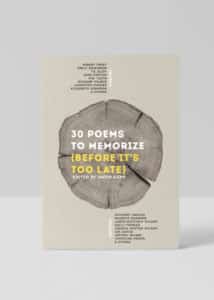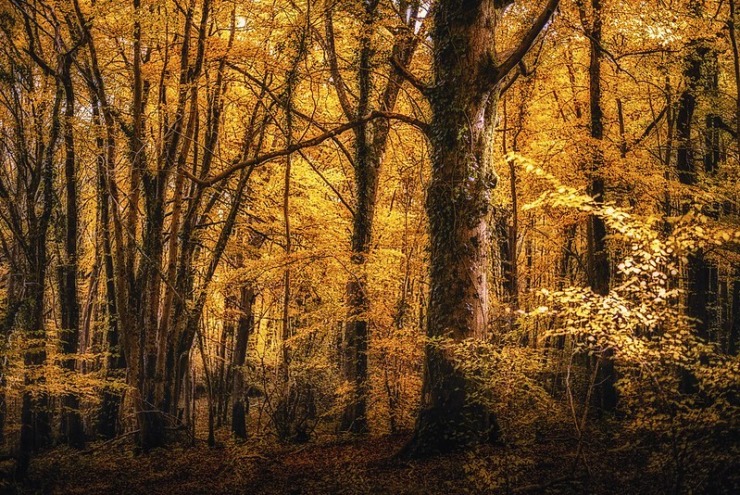Writer David Kern tells us that memorization is about love and memory — love for the things we remember the most. My eight-year-old grandson can rattle off sports scores and statistics like the most experienced sports analyst, but then, he loves sports. My wife knows the lyrics to virtually every song from the British Invasion of the 1960s. I can remember daily itineraries for six visits to England, including the first one in 1983. Our own Sandra Heska King even memorized the 131-line “The Love Song of J. Alfred Prufrock.”
My 12th grade English teacher had a slightly different view. She required each of us in a class of 30 boys to memorize at least one soliloquy by Shakespeare, because “you’re not educated unless you can recite a soliloquy by Shakespeare.” I chose the dagger scene from Macbeth, and I dutifully (as required) memorized it and recited it before the class. I still remember it today: “Is this a dagger which I see before me, / the handle toward my hand? Come, let me clutch thee. / I have thee not, and yet I still thee still …”
Decades later, when we saw an outdoor performance of Macbeth, my wife had to elbow me when I started reciting the speech along with the actor.

Each of the 30 selections includes a poem, an introduction to the poet, and a short essay about the poem. Entries are democratically listed — alphabetically by poet. The poets are all well-known and represent a mix of living and dead, including W.H. Auden, Wendell Berry, Paul Laurence Dunbar, John Donne, Homer, T.S. Eliot, Jane Kenyon, William Shakespeare, Dana Gioia, A.E. Stallings, Wallace Stevens, William Wordsworth, and more.
The poems include familiar and not so familiar selections. We have “God’s Grandeur” by Gerard Manly Hopkins, a selection from The Iliad and The Odyssey, and “Bright Star” by John Keats. And we have “Words” by Dana Gioia, “Act of Imagination” by Elizabeth Jennings, “Listening to Peter and the Wolf with Jason, Aged Three” by A.E, Stallings, and the Agincourt speech from Henry V by Shakespeare.
One of the included poems is by Robert Hayden (1913-1980), a poet raised in several different homes in Detroit who didn’t achieve widespread acclaim until 1966.
Those Winter Sundays
Sundays too my father got up early
and put his clothes on in the blueblack cold,
then with cracked hands that ached
from labor in the weekday weather made
banked fires blaze. No one ever thanked him.
I’d wake and hear the cold splintering, breaking.
When the rooms were warm, he’d call,
and slowly I would rise and dress,
fearing the chronic angers of that house,
Speaking indifferently to him,
who had driven out the cold
and polished my good shoes as well.
What did I know, what did I know
of love’s austere and lonely offices?
The contributors are all published writers and poets, including Jeffrey Bilbro, James Matthew Wilson, A.M. Juster, Sally Thomas, Maurice Manning, Ian Andrews, Anthony Esolen, Heidi White, Jessica Hooten Wilson, and others. Kern served as the general editor and also contributed the entries on Kenyon, Stevens, and Eliot.

David Kern
Mix poets, poems, and contributors’ essays together, and what results is a love letter to poetry and a genuine pleasure to read and enjoy.
Kern is the host of two podcasts, The Daily Poem and Close Roads, editor of FORMA Journal, and a vice president of the Circe Institute. He’s published numerous articles on film, television, books, and popular culture. He lives in North Carolina.
And when exactly is too late to memorize poems? I searched diligently for an answer in 30 Poems to Memorize (Before It’s Too Late), until I realized it was staring me in the face. It’s never too late. It’s only too late when you die: “I go, and it is done; the bell invites me. / Hear it not, Duncan, for it is a knell / That summons thee to heaven or to hell.”
Photo by Yann Coeuru, Creative Commons, via Flickr. Post by Glynn Young.
__________________________

“I require all our incoming poetry students—in the MFA I direct—to buy and read this book.”
—Jeanetta Calhoun Mish

Sandra Heska King says
“Let us go then, you and I,
When the evening is spread out against the sky
Like a patient etherized upon a table”
That often pops into my head unbidden. Kind of like “Fourscore and seven years ago…”
I’ve been keeping a notebook of poems I’ve memorized. I instructed D and my kids that should I ever become incapacitated in some form, they are to read them to me to wake my neurons up.
Never too early. Never too late.
Glynn says
And don’t forget “The Alligator’s Swamp Jungle Ball.” It doesn’t have quite the same lovely flow of Prufrock, but it is popular among people who attract alligators, or people who go seeking them out. https://faithfictionfriends.blogspot.com/2010/01/alligators-swamp-jungle-ball.html
Sandra Heska King says
I remember that poem. LOVE that poem! It’s memorable.
I don’t know why Kern didn’t add that to make 31.
Bethany says
Such a wise idea, Sandra. And I’m still in awe of your memorizing that poem.
Rick Maxson says
I heard this poem on the Sunday Morning program last year for the first time. It brought back some fond memories and fonder realizations. We don’t always appreciate the things our parents do in the years when they do them.
In Ohio, growing up, we had a coal furnace. Our basement had a corner dedicated to holding the coal, delivered via a long chute from a truck at the street curb. It was a great place for a boy to play in and so it was forbidden. Coal dust was difficult to remove with the “washing machines” in the late 40’s and early 50’s.
At night the house temperature would drop into the 50-60 range as the coal burned down. My father woke before any of us to shovel coal into that furnace.
Glynn says
What a great memory! Growing up in New Orleans, I wouldn’t have known a coal furnace if it smacked me upside the head. But those washing machines! I remember our first one – it actually had rollers for wringing out the water. The dryer was a clothesline in the backyard.
Rick Maxson says
Yup, exactly! And the clothes smelled amazing without chemicals.
Bethany R. says
Rick, your mention of your father waking up on cold mornings to shovel coal into the furnace reminds me of the poem, “Those Winter Sundays,” by Robert Hayden.
Bethany says
Okay, this is too funny. I went to the comments first (sometimes I like to read others’ perspectives before I read a post) and now just scrolled up and saw “Those Winter Sundays” sitting there. 😉
Glynn says
Bethany, great minds think alike.
Rick Maxson says
I should mention another book by Tony Hoagland, “Twenty Poems That Could Save America.” I appreciate it for being the vehicle where I discovered Genevieve Taggard and the poem, “The Geraniums.”
Bethany R. says
I’ll have to look that up.
Glynn says
We should do a series on great discoveries in books or articles we’re reading. That’s how I discovered poets like Norm Nicholson, Benjamin Myers, Justin Hamm, Mark Jarman, Dana Gioia, and many more.
Rick Maxson says
I’ve been worried about Dana Gioia. His family lives in Sonoma.
Megan Willome says
Sandy, I love your instructions to your family.
I’ve been listening all month to Kern’s “Good Reads” podcast, and I love it.
I’ll check out the list for future By Heart columns. Once you start memorizing poems, it’s addictive,